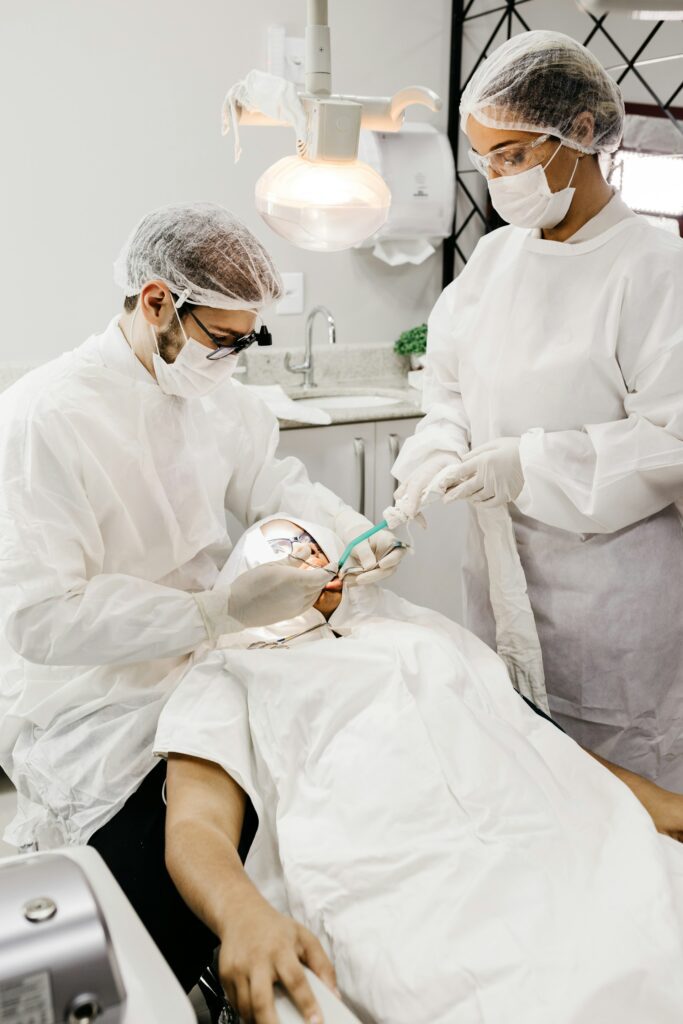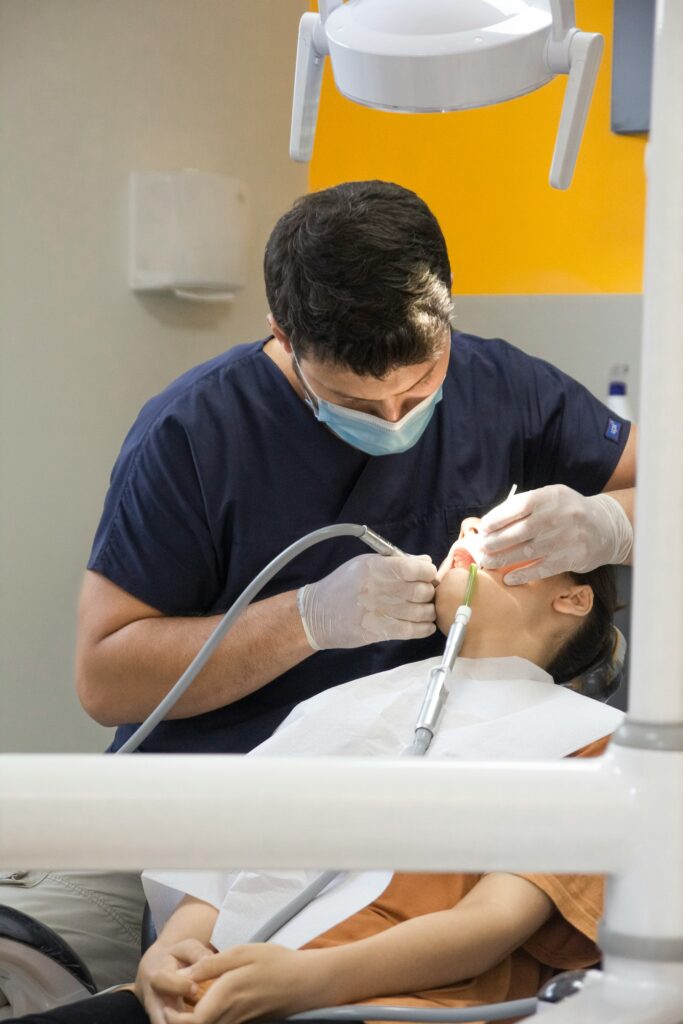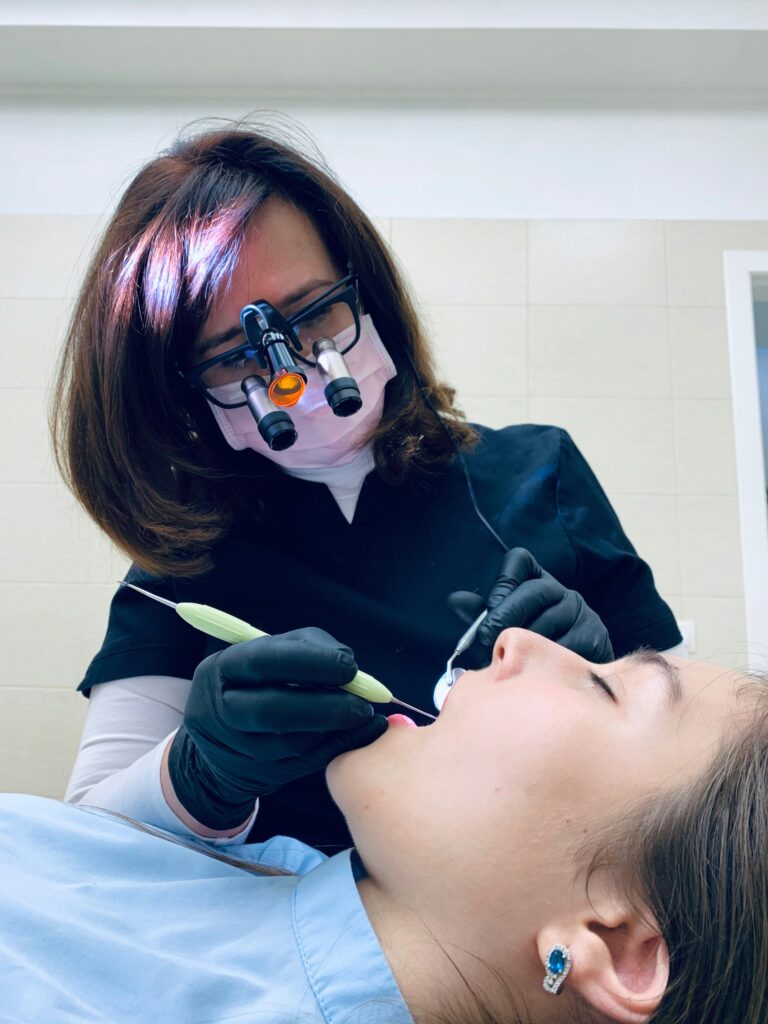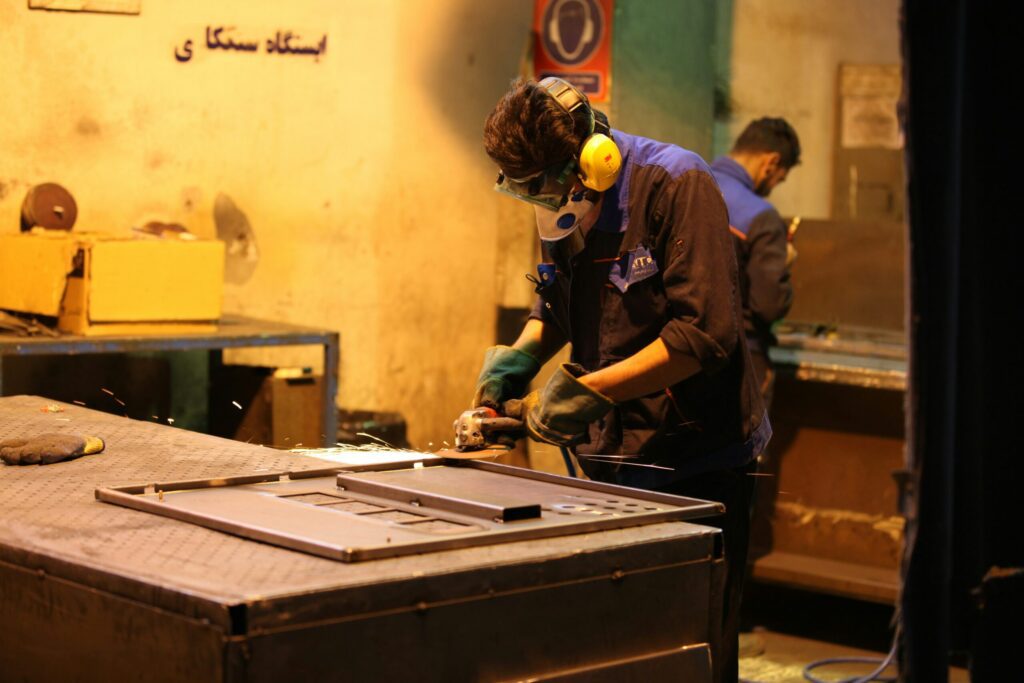In the United Kingdom, dental technician jobs are in high demand in the healthcare industry. Dental technicians are the experts behind every flawless crown, denture, or orthodontic appliance, but when we think of dentistry, we typically imagine dentists and hygienists. To assist patients in restoring confidence in their smiles, dental technicians in the UK combine science, creativity, and precision in their work, making them vital members of the healthcare system. Working in laboratories, dental technicians design and fabricate unique dental devices according to the dentist’s specifications, utilising cutting-edge materials and technology. This line of work combines practical craftsmanship with cutting-edge computer methods, and demand for it is rising in both the NHS and the commercial sector. This could be ideal for people who are meticulous, steady-handed, and passionate about helping others often without being the centre of attention.
Read Also: DENTAL HYGIENE JOBS IN THE UK WITH SALARY
Who is a Dental Technician?
 A dental technician makes appliances and restorations to order. They manufacture dentures, bridges, and crowns, among other prostheses. Dental technicians do not work in offices; instead, they operate in laboratories. They collaborate closely with your dentist to achieve the desired outcome. In addition to crowns, bridges, maxillofacial prosthetic equipment, and mouthguards, dental technicians also build and fix dentures, or artificial teeth. Dental technicians might operate alone or in small teams in dental labs. Dentists and dental prosthetists collaborate closely with dental technicians. The occupation of a dental technician necessitates certain knowledge and abilities in dentistry. By designing and maintaining dental prostheses like dentures, crowns, bridges, and orthodontic appliances, dental technicians play a vital part in the dentistry industry. Although there are many benefits to this line of work, there are drawbacks as well.
A dental technician makes appliances and restorations to order. They manufacture dentures, bridges, and crowns, among other prostheses. Dental technicians do not work in offices; instead, they operate in laboratories. They collaborate closely with your dentist to achieve the desired outcome. In addition to crowns, bridges, maxillofacial prosthetic equipment, and mouthguards, dental technicians also build and fix dentures, or artificial teeth. Dental technicians might operate alone or in small teams in dental labs. Dentists and dental prosthetists collaborate closely with dental technicians. The occupation of a dental technician necessitates certain knowledge and abilities in dentistry. By designing and maintaining dental prostheses like dentures, crowns, bridges, and orthodontic appliances, dental technicians play a vital part in the dentistry industry. Although there are many benefits to this line of work, there are drawbacks as well.
Advantages of Dental Technician Jobs
-
Job stability
As the population ages and knowledge of oral health rises, there will likely be a steady increase in demand for dental technicians in the years to come. For people employed in this industry, this offers stability and employment security.
-
Hands-on work
Dental technicians can make unique dental prostheses by using their artistic abilities and hands. For those with a creative flair and a love of manual labour, this can be rewarding.
-
Opportunities for job advancement
Dental technicians can specialise in fields like orthodontics or implantology to improve their careers with experience and additional education. This gives them the chance to develop professionally and broaden their skill set.
-
Assisting patients
Indirectly, dental technicians help patients’ general health and oral health. They help dentists restore patients’ smiles and improve their quality of life by producing high-quality dental prostheses.
Read Also: Private Medical Insurance in the UK
Major Setbacks You May Encounter
-
Repeated tasks
Duties including pouring moulds, polishing, and waxing dental prosthesis are frequently performed by dental professionals. Inadequate posture and ergonomics might result in physical strain and possible musculoskeletal problems.
-
Time constraints
Dental technicians frequently have to complete their tasks by a certain date, particularly in urgent cases. Since they have a limited amount of time to guarantee the precision and calibre of their job, this might lead to strain and tension. Dental technicians work with a variety of materials, including chemicals for fabrication and poisonous compounds like mercury. Adherence to appropriate safety measures is necessary to reduce exposure risk and potential health risks.
-
Infrequent patient contact
Dental technicians rarely have direct patient contact, in contrast to dentists or dental hygienists. People who prefer more patient-facing professions may not be a good fit for them because their primary communication is with dentists and dental assistants.
What is the Job of a Dental Technician?
 A person who has received training in creating prostheses for dental patients is known as a dental technician. Crowns, veneers, complete or partial dentures, and orthodontic appliances are some examples of these devices. Obtaining information from the patient’s dentist, including moulds or impressions from the patient’s mouth, is part of the duties of a dental technician. The dentist would give the dental technician specific instructions on what he wants done. It will be the responsibility of the dental technician to gather this data and use it to work with the moulds to construct the precise prostheses that the patient needs. They use modest hand tools for the majority of their work. To perform this kind of labour all day, they need to be incredibly patient and meticulous.
A person who has received training in creating prostheses for dental patients is known as a dental technician. Crowns, veneers, complete or partial dentures, and orthodontic appliances are some examples of these devices. Obtaining information from the patient’s dentist, including moulds or impressions from the patient’s mouth, is part of the duties of a dental technician. The dentist would give the dental technician specific instructions on what he wants done. It will be the responsibility of the dental technician to gather this data and use it to work with the moulds to construct the precise prostheses that the patient needs. They use modest hand tools for the majority of their work. To perform this kind of labour all day, they need to be incredibly patient and meticulous.
Employment of dental and ophthalmic laboratory technicians and medical appliance technicians in the UK will decrease by 1% between 2023 and 2033. While employment is expected to decline, there will be an average of 7,200 openings annually for Dental technician positions over the decade.
Read Also: Consulting Jobs in the UK
Dental Technician Job Environment
 Although dental technicians work alongside dentists, they typically spend a large portion of their time in the laboratory. Technicians adhere to precise guidelines provided by dentists and hygienists to satisfy the demands of each patient. They combine art, science, and technology in two dental specialties: orthodontics and restorative dentistry. Within the UK, dental laboratories are governed by the National Association of Dental Laboratories. Members of NADL typically adhere to stricter guidelines and have higher standards, which lends the lab more legitimacy.
Although dental technicians work alongside dentists, they typically spend a large portion of their time in the laboratory. Technicians adhere to precise guidelines provided by dentists and hygienists to satisfy the demands of each patient. They combine art, science, and technology in two dental specialties: orthodontics and restorative dentistry. Within the UK, dental laboratories are governed by the National Association of Dental Laboratories. Members of NADL typically adhere to stricter guidelines and have higher standards, which lends the lab more legitimacy.
What Are Their Responsibilities?
- Performing all prosthetic work, such as creating mouth guards, bites, and casts.
- Create both metal and non-metal partial or complete dentures to replace lost teeth.
- Create precise models of the mouth and teeth using the dentist’s imprints of the patient’s mouth.
- Employ a variety of dental procedures for restorative work, such as IPS e.max, Smile Design cases, dental composites, and diagnostic wax-ups.
- Restorations of presses recreate natural teeth by the creation of dental implants or crowns, veneers, and bridges.
- Produce fixed or removable items, such as braces, retainers, and dentures, to address dental abnormalities.
- Create maxillofacial prostheses to replace lost facial and body tissues brought on by illness, trauma, or developmental abnormalities.
- Employ both conventional techniques and CAD/CAM more and more while creating dental equipment.
- Keep track of dental laboratory records and write reports on lab operations.
- By taking advantage of educational opportunities, reading trade journals, keeping up with professional associations, and maintaining personal networks, you can keep your dental laboratory knowledge and abilities up to date.
Read Also: Highest Paying Jobs in the UK 2025
What Do Dental Technicians Do?
The first thing a dental technician does when a patient arrives for treatment is take several X-rays. After that, a dental radiologist receives these to interpret. The dental technician will help with the process after making an appointment for the patient to see the dentist. This can entail prepping the patient’s mouth for treatment, giving local anaesthesia, or taking impressions of the patient’s teeth to create a personalised dental prosthetic.
In addition, the dental technician will be in charge of laboratory work. This could entail preparing materials for dental operations, sterilising equipment, and combining adhesives or chemicals used in dental procedures. In the dental laboratory, dental technicians are also in charge of documenting all patient technical data.
-
Maintaining patient records and keeping documents
Recording all patient information is one of the dental technician’s primary duties. This comprises their payment details, medical history, and any notes made by the dentist. When new information is added, you will also be responsible for updating patient data. In the dental laboratory, responding to enquiries from patients is another aspect of the work.
-
Combined Chemical and Adhesive Mixture
As a dental technician, you will mix different adhesives and chemicals for dental operations. You will also need to properly label and store them. Endodontic irrigants, dental cements, sealants, adhesives, and disinfectants are a few examples of these substances. You will ensure that the proper amounts are being used and that everything is being stored at the proper humidity and temperature.
-
Getting Dental Procedure Materials Ready
The dental materials that the dentist will use during procedures must be prepared by dental technicians. This involves placing restorations, such as crowns or fillings, creating a cast of the patient’s mouth to obtain a bite impression, or taking tooth impressions to make a personalised dental prosthetic.
-
Taking Dental X-Rays | Dental Technician
At the dental laboratory, the dental technician will take dental X-rays, which then go to a dental radiologist for interpretation. This is one of the most important tasks you will perform as a dental technician because it is an essential part of the dental procedure that enables the dentist to see inside the patient’s mouth.
-
Providing Tools for Maintenance and Cleaning
Dental technicians are in charge of cleaning dental tools both before and after use, in addition to maintaining them. This covers dental tools such as ultrasonic aspirators and scaling and polishing handpieces. You may help stop the spread of infectious diseases by making sure you are following the right hygiene and sterilisation practices.
-
Maintain the facility and its equipment
The dental technician is also in charge of maintaining the equipment in the dental office and ensuring that it is in good operating order. This entails inspecting the suction equipment, airflow, water tank, and dental chair. The dental technician will conduct regular maintenance and cleanliness inspections of the dental office’s infrastructure. This could entail dusting furnishings and equipment, cleaning windows, and sweeping, mopping, or vacuuming the walls and floors.
Read Also: Travel Nurse Jobs in Europe 2025
Where to Find Dental Technician Jobs
Dental technicians are highly qualified individuals who create dental prostheses in lab settings. Some dental technicians employ other technicians in addition to working in their labs. Some labs are rather tiny, and each technician needs to be multi-skilled. Other labs allow for some task distinction and are quite large. In any case, dental technicians feel at ease operating in a hygienic laboratory setting while adhering to stringent quality and safety regulations.
Soft Skills for Dental Technician Jobs
-
Dexterity
One of the most crucial abilities a dental technician can possess is dexterity. It takes steady hands and precise movements to work with small instruments and complex materials. Even the smallest detail can have a significant impact on a patient’s comfort and confidence, whether it’s sculpting a crown, layering porcelain, or modifying the fit of a denture. High-quality, custom-made dental appliances that seem natural and work flawlessly are made possible by dental technicians with strong hand-eye coordination and fine motor skills. Dexterity is an essential component of the profession since it combines technical proficiency with meticulous attention to detail.
-
Attention to Detail
The key to being a competent dental technician is paying close attention to details. Every appliance they make, including dentures, crowns, bridges, and orthodontic devices, must be precisely the same in terms of size, form, and colour. The slightest error can have an impact on a patient’s confidence, comfort, or bite. Because of this, dental technicians need to be extremely careful in their job, closely adhering to dentists’ instructions and verifying every stage of the procedure. In addition to guaranteeing quality and precision, this ability aids in providing the greatest results for patients who depend on these specially designed solutions daily.
-
Critical Thinking Skills
For dental technicians, critical thinking is essential because each case is unique and frequently presents a unique set of difficulties. Dental technicians must use both logical and creative thinking while determining how to fix unexpected problems during the design process, modifying materials to fit a patient’s bite, or improving the fit of a denture. They frequently have to make decisions that strike a balance between durability, functionality, and beauty while working with little information. Having the ability to evaluate an issue, weigh several potential solutions, and select the best one guarantees that the end product will satisfy patient and clinical requirements.
-
Listening Skills
When you think of a dental technician, listening may not be the first talent that springs to mind, but it’s crucial. Working closely with dentists and other dental professionals, dental technicians must be able to pay close attention to patient-specific needs, feedback, and directions. Effective listening guarantees precision and seamless cooperation, whether it’s comprehending intricate crown specifications or modifying a tool in response to the dentist’s observations. Additionally, it fosters trust within the dental team, which eventually improves patient care and outcomes.
-
Reading comprehension
Reading comprehension is an essential skill for dental technicians because a large part of their work involves understanding written instructions, technical drawings, and patient records. A small misinterpretation of a prescription or lab order can lead to costly mistakes or delays in treatment. Dental technicians need to accurately read and interpret complex information—from measurements and material requirements to detailed case notes—so they can craft appliances that meet both functional and aesthetic expectations. Strong reading comprehension ensures that nothing gets lost in translation, helping technicians produce high-quality, precise results every time.
-
Interpersonal Skills
Even though the majority of a dental technician’s work is in the background, having good people skills is still essential. Since technicians frequently work alongside dentists, dental nurses, and occasionally even patients, professional demeanour and good communication are crucial. Being personable, kind, and easy to deal with promotes the development of solid working relationships and guarantees that everyone agrees, particularly when discussing complicated issues or making last-minute changes. A good, team-oriented atmosphere where patient care is prioritised is also facilitated by having strong interpersonal skills.
How to Become a Dental Technician
The steps required to become a dental technician are as follows:
-
Get your high school degree or its equivalent
A high school graduate may work for a dental laboratory and receive training to become a dental technician. Following five years of employment, you can use the experience you acquire to apply for a dental technician certificate or to take the licensing exam. As an alternative, you can apply for this qualification directly out of high school at a dental technician school. Although a degree is not necessary to work as a dental technician, it is good to acquire formal education or training to increase your employability.
-
Apply to a school for dental technicians
The majority of dental technician education programs last two years or more. Community colleges, technical colleges, vocational institutions, universities, and dental schools frequently provide programs. To guarantee that the educational program provides a well-rounded education and teaches the crucial elements of the profession. Also, confirm that the programs are approved by the appropriate certifying body.
-
To become certified, take the test
Following graduation, you sit for a test given by the National Board for Certification in Dental Laboratory Technology. Those without a formal education frequently have to labour for five years to obtain sufficient experience to sit for the test. You can become a certified dental technician by passing the exam. Earning more money, expanding your employment options, and enhancing your job and career happiness are all benefits of becoming a licensed dental technician.
Important Qualifications for Dental Technician Jobs
Before you can begin working as a dental technician, you must register with the General Dental Council (GDC). You must finish a dental technology qualification that has been authorised by the GDC to be added to the register. There are the following levels of courses available:
BTEC Level 3 Extended Diploma in Dental Technology: four GCSEs in grades 4–7 (A–C) are normally required.
An apprenticeship or trainee dental technician position at a dental laboratory is a requirement for a foundation degree in dental technology.
BSc (Hons) in dental technology: Three A-levels, including one in a science, are typically required for admission.
Salary for Dental Technician Jobs
Newly qualified dental technicians may begin earning as much as £22,000. This can increase to nearly £42,000 after you’ve gained years of experience and honed your speciality. Starting salaries in the NHS typically range from £28,407 to £34,581. In the NHS, executive dental technician jobs and specialist technologists can make between £35,392 to £42,618. Some highly specialised dental technician jobs may pay between £43,742 and £50,056.
Read Also: Caregiver Jobs in UK with Visa Sponsorship
Conclusion
Dental technician jobs in the United Kingdom are essential in moulding not only smiles but also lives. A competent specialist combining science, craftsmanship, and care is responsible for each perfectly fitted crown or denture that looks natural. Stability, innovation, and the opportunity to truly have an impact without being in the spotlight are all benefits of this career path. This is in high demand in both the NHS and the commercial sector. For people who like solving problems, working with their hands, and being a part of a caring healthcare team, working dental technician jobs can be fulfilling and worthwhile.





